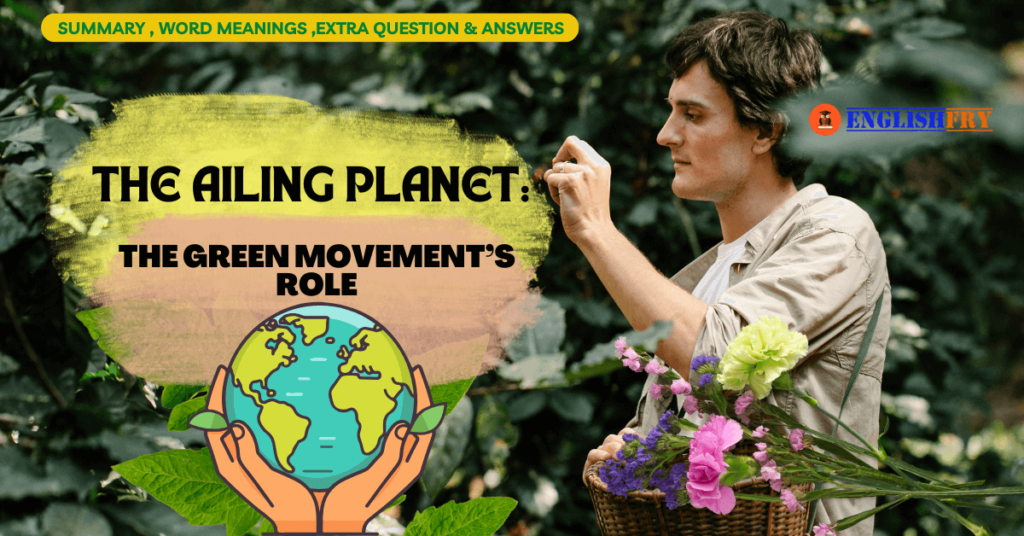Table of Contents
ToggleClass 11 The Ailing Planet Summary
This NCERT Solutions For Class 11 English Hornbill The Ailing Planet delves into the factors contributing to the planet’s deteriorating health. Originally, it is presented as an article authored by Nani Palkhivala, published in ‘The Indian Express’ on November 23, 1994. Palkhivala’s article centers on the Green Movement and its significance in addressing environmental concerns. Notably, it mentions a zoo’s declaration of humans as the “world’s most dangerous animals.”
The writer highlights a shift in societal perceptions from materialism to a holistic ecological view. This new perspective emphasizes environmental concerns and views the planet as a living organism with its own metabolic processes.
The concept of Sustainable Growth, coined in 1987, is introduced, stressing the need to meet current needs without compromising future generations. The responsible utilization of natural resources becomes paramount. People are seen as partners rather than mere inhabitants of the planet.
The chapter identifies four major biological systems: fisheries, forests, croplands, and grasslands, which form the foundation of industries. Unsustainable resource exploitation is a growing concern. Forest land depletion and the misallocation of dung as fuel, rather than natural fertilizer, are highlighted issues.
The Constitution of India’s Article 48A, calling for the protection and improvement of forests and wildlife, is discussed, emphasizing the need for proper enforcement. A parliamentary committee report underscores the annual decline of forest land by 3.7 million acres. The United Nations warns of severe environmental deterioration in 88 countries.
The population’s rapid growth poses challenges to development. Effective family planning is essential to control overpopulation. Industries are urged to shoulder responsibility for a healthier ecosystem.
CONCLUSION OF THE AILING PLANET: THE GREEN MOVEMENT’S ROLE
In conclusion, ‘The Ailing Planet: The Green Movement’s Role’ emphasizes the critical state of the planet and the urgent need for action to preserve it.

Class 11 The Ailing Planet Summary in Hindi
यह अध्याय ग्रह के बिगड़ते स्वास्थ्य में योगदान देने वाले कारकों पर चर्चा करता है। मूल रूप से, इसे नानी पालखीवाला द्वारा लिखित एक लेख के रूप में प्रस्तुत किया गया है, जो 23 नवंबर, 1994 को ‘द इंडियन एक्सप्रेस’ में प्रकाशित हुआ था। पालखीवाला का लेख हरित आंदोलन और पर्यावरण संबंधी चिंताओं को संबोधित करने में इसके महत्व पर केंद्रित है। विशेष रूप से, इसमें एक चिड़ियाघर द्वारा मनुष्यों को “दुनिया का सबसे खतरनाक जानवर” घोषित करने का उल्लेख है।
लेखक भौतिकवाद से समग्र पारिस्थितिक दृष्टिकोण की ओर सामाजिक धारणाओं में बदलाव पर प्रकाश डालता है। यह नया परिप्रेक्ष्य पर्यावरणीय चिंताओं पर जोर देता है और ग्रह को अपनी चयापचय प्रक्रियाओं के साथ एक जीवित जीव के रूप में देखता है। 1987 में गढ़ी गई सतत विकास की अवधारणा पेश की गई, जिसमें भावी पीढ़ियों से समझौता किए बिना वर्तमान जरूरतों को पूरा करने की आवश्यकता पर जोर दिया गया। प्राकृतिक संसाधनों का जिम्मेदारीपूर्ण उपयोग सर्वोपरि हो जाता है।
लोगों को ग्रह के मात्र निवासियों के बजाय साझेदार के रूप में देखा जाता है। अध्याय चार प्रमुख जैविक प्रणालियों की पहचान करता है: मत्स्य पालन, वन, फसल भूमि और घास के मैदान, जो उद्योगों की नींव बनाते हैं। संसाधनों का निरंतर दोहन एक बढ़ती हुई चिंता का विषय है। वन भूमि की कमी और प्राकृतिक उर्वरक के बजाय ईंधन के रूप में गोबर का गलत आवंटन, प्रमुख मुद्दे हैं। भारत के संविधान के अनुच्छेद 48ए, जिसमें वनों और वन्यजीवों की सुरक्षा और सुधार का आह्वान किया गया है, पर उचित प्रवर्तन की आवश्यकता पर बल देते हुए चर्चा की गई है।
एक संसदीय समिति की रिपोर्ट वन भूमि की वार्षिक गिरावट को 3.7 मिलियन एकड़ तक रेखांकित करती है। संयुक्त राष्ट्र ने 88 देशों में गंभीर पर्यावरणीय गिरावट की चेतावनी दी है। जनसंख्या की तीव्र वृद्धि विकास के लिए चुनौतियाँ उत्पन्न करती है। अधिक जनसंख्या को नियंत्रित करने के लिए प्रभावी परिवार नियोजन आवश्यक है। उद्योगों से एक स्वस्थ पारिस्थितिकी तंत्र के लिए जिम्मेदारी उठाने का आग्रह किया जाता है।

Class 11 The Ailing Planet Summary in Assamese
এই অধ্যায়ত গ্ৰহটোৰ স্বাস্থ্যৰ অৱনতি ঘটাত অৰিহণা যোগোৱা কাৰকসমূহৰ বিষয়ে গভীৰভাৱে আলোচনা কৰা হৈছে। মূলতঃ ইয়াক ১৯৯৪ চনৰ ২৩ নৱেম্বৰত ‘দ্য ইণ্ডিয়ান এক্সপ্ৰেছ’ত প্ৰকাশিত ননী পালখিভালাৰ ৰচনা কৰা প্ৰবন্ধ হিচাপে উপস্থাপন কৰা হৈছে।পালখিভালাৰ প্ৰবন্ধটো সেউজ আন্দোলন আৰু পৰিৱেশৰ চিন্তা-চৰ্চাৰ সমাধানৰ ক্ষেত্ৰত ইয়াৰ তাৎপৰ্য্যৰ ওপৰত কেন্দ্ৰিত।
উল্লেখযোগ্য যে ইয়াত চিৰিয়াখানা এখনে মানুহক “বিশ্বৰ আটাইতকৈ বিপজ্জনক প্ৰাণী” বুলি ঘোষণা কৰাৰ কথা উল্লেখ কৰা হৈছে। লেখকে সমাজৰ ধাৰণাৰ বস্তুবাদৰ পৰা সামগ্ৰিক পৰিৱেশ দৃষ্টিভংগীলৈ পৰিৱৰ্তনৰ ওপৰত আলোকপাত কৰিছে। এই নতুন দৃষ্টিভংগীয়ে পৰিৱেশৰ চিন্তাত গুৰুত্ব আৰোপ কৰে আৰু গ্ৰহটোক নিজস্ব বিপাকীয় প্ৰক্ৰিয়া থকা জীৱিত জীৱ হিচাপে চায়।
১৯৮৭ চনত উদ্ভাৱন কৰা বহনক্ষম বৃদ্ধিৰ ধাৰণাটো প্ৰৱৰ্তন কৰা হৈছে, য’ত ভৱিষ্যত প্ৰজন্মৰ সৈতে আপোচ নকৰাকৈ বৰ্তমানৰ প্ৰয়োজনীয়তা পূৰণ কৰাৰ প্ৰয়োজনীয়তাৰ ওপৰত গুৰুত্ব আৰোপ কৰা হৈছে। প্ৰাকৃতিক সম্পদৰ দায়িত্বশীল ব্যৱহাৰ সৰ্বোচ্চ হৈ পৰে। মানুহক কেৱল গ্ৰহটোৰ বাসিন্দা হিচাপে নহয়, অংশীদাৰ হিচাপেহে দেখা যায়।
অধ্যায়টোত চাৰিটা প্ৰধান জৈৱিক ব্যৱস্থা চিনাক্ত কৰা হৈছে: মীনপালন, বনাঞ্চল, শস্যৰ মাটি আৰু ঘাঁহনি, যিবোৰে উদ্যোগৰ ভেটি গঠন কৰে। অস্থায়ী সম্পদ শোষণ ক্ৰমাৎ চিন্তাৰ বিষয়। বনাঞ্চলৰ ভূমিৰ অভাৱ আৰু প্ৰাকৃতিক সাৰতকৈ ইন্ধন হিচাপে গোবৰৰ ভুল আবণ্টন এইবোৰ উজ্জ্বল বিষয়। বনাঞ্চল আৰু বন্যপ্ৰাণীৰ সুৰক্ষা আৰু উন্নতিৰ আহ্বান জনোৱা ভাৰতৰ সংবিধানৰ ৪৮এ অনুচ্ছেদত সঠিক বলবৎকৰণৰ প্ৰয়োজনীয়তাৰ ওপৰত গুৰুত্ব আৰোপ কৰা হৈছে।
সংসদীয় সমিতিৰ প্ৰতিবেদনত বনাঞ্চলৰ মাটি ৩৭ লাখ একৰ বাৰ্ষিক হ্ৰাস পোৱাৰ ওপৰত আলোকপাত কৰা হৈছে। ৮৮খন দেশৰ পৰিৱেশৰ ভয়াৱহ অৱনতিৰ সতৰ্কবাণী ৰাষ্ট্ৰসংঘই। জনসংখ্যাৰ দ্ৰুত বৃদ্ধিয়ে উন্নয়নৰ বাবে প্ৰত্যাহ্বানৰ সৃষ্টি কৰিছে। অতিৰিক্ত জনসংখ্যা নিয়ন্ত্ৰণ কৰিবলৈ ফলপ্ৰসূ পৰিয়াল পৰিকল্পনা অতি প্ৰয়োজনীয়। উদ্যোগসমূহক সুস্থ পৰিৱেশ তন্ত্ৰৰ বাবে দায়িত্ব কান্ধত ল’বলৈ আহ্বান জনোৱা হৈছে
Word Meanings
| Word | Meaning |
| Deteriorating | Getting worse or declining in quality or condition. |
| Holistic | Considering the whole rather than just individual parts |
| Sustainable | Capable of being maintained or continued over the long term |
| Exploitation | The act of using something for one’s own benefit. |
| Depletion | The reduction or exhaustion of a resource or supply |
| Misallocation | The incorrect or inefficient assignment or use of something |
| Enforcement | The act of ensuring that rules or laws are obeyed |
| Undergoing | Experiencing or undergoing a process or change. |
| Urgent | Requiring immediate attention or action due to its importance |
| Preserve | To protect or keep something in its original state or condition |
NCERT Solutions For Class 11 English Hornbill The Ailing Planet
Extra Question & Answers
Question 1: Which movement does Nani Palkhivala refer to? How popular do you think it is?
Answer: Nani Palkhivala refers to the ‘Green Movement,’ which has become very popular among people worldwide. It started almost 25 years ago and rapidly captured the imagination of the entire human race.
Question 2: How does the author point out the importance of Green Movement?
Answer: The author highlights the importance of the Green Movement by comparing it to Copernicus’s revolutionary ideas in the 16th century, which taught that the Earth and other planets revolve around the sun.
Question 3: How have human beings shifted their perceptions?
Answer: We have shifted our perceptions from a mechanistic view to a holistic and ecological view. We now consider the Earth as a living organism with its own metabolic needs and vital processes that we must respect and preserve.
Question 4: What is the state of earth today? How should we act now?
Answer: The Earth’s signs connected with life indicate that it is in declining health. We must realize our moral obligation to be good stewards of the planet and act as responsible trustees of the legacy for future generations.
Question 5: How has the concept of sustainable development been defined?
Answer: Sustainable development is defined as development that meets the needs of the present without endangering the ability of future generations to meet their needs.
Question 6: Who is ‘the world’s most dangerous animal’? What has he learnt?
Answer: Man is the world’s most dangerous animal, but he has learned a new awareness and shifted from a system of domination to one based on partnership.
Question 7: What do you learn about the number of living species from this chapter?
Answer: Scientists have listed approximately 1.4 million living species, but the number of unlisted species varies from three to a hundred million according to various estimates, remaining unknown and unidentified.
Question 8: What do you know about the earth’s biological systems and their functions?
Answer: The Earth has four principal biological systems: fisheries, forests, grasslands, and croplands, which are crucial for the world’s economy, providing food and raw materials.
Question 9: What is the state of earth’s biological systems now and why?
Answer: In many areas of the world, Earth’s biological systems have reached unsustainable levels due to excessive pressure from humans, damaging their productivity.
Question 10: How do the earth’s biological systems behave on reaching an unsustainable level?
Answer: When Earth’s biological systems reach unsustainable levels, their productivity is impaired. Fisheries collapse, forests disappear, grasslands turn into barren wastelands, and croplands deteriorate.
Question 11: How can over-fishing and decimation of forests prove harmful?
Answer: Over-fishing can lead to stripping the fisheries, depriving man of a rich source of protein. The decimation of forests can harm ecology and lead to the extinction of species living in forests.
Question 12: How do Indians procure fuel for cooking? What is the result of their action?
Answer: Indians procure fuel for cooking by collecting firewood from forests, even cutting down green trees at times, and burning dung as fuel, which depletes soil fertility.
Question 13: Why do we need to plant more forests in India?
Answer: India needs to plant more forests because it is losing them at a rapid rate, with official data indicating a loss of 3.7 million acres per year.
Question 14: How is the world population increasing over the years?
Answer: The world population is increasing rapidly, with one million people being added every four days. The world population was about one billion in 1800, but it increased to 3.7 billion in the next 100 years.
Question 15: Why is population control essential in India?
Answer: Population control is essential in India because overpopulation disrupts development plans, leading to poverty and unemployment. Voluntary family planning can help control population growth.
Question 16: What do you understand by the emerging new world vision?
Answer: The emerging new world vision is holistic and ecological, viewing the world as an integrated whole, a global village, rather than isolated parts, ushering in the era of responsibility.
Question 17: How can industry play its role in the new ‘era of responsibility’?
Answer: Industry can play a significant role in the new era of responsibility by becoming more environmentally conscious and adopting practices that preserve the environment.
Question 18: In what connection has the author mentioned Mr. Edgar S. Woolard?
Answer: Mr. Edgar S. Woolard, the chairman of Du Pont, declared himself the company’s ‘Chief Environmental Officer’ five years ago, emphasizing the company’s commitment to environmental excellence.
Question 19: Why does the author quote the words of Mrs. Margaret Thatcher and Mr. Lester Brown?
Answer: The author quotes the words of Mrs. Margaret Thatcher and Mr. Lester Brown to support his viewpoint about the need to protect the environment and preserve it for future generations.
B. LONG ANSWER TYPE QUESTIONS
Question 1: Why does Nani Palkhivala call the earth ‘The Ailing Planet’? How can the ailing planet survive?
Answer: Nani Palkhivala calls the Earth ‘The Ailing Planet’ because signs of environmental degradation and decline in the health of the planet are evident. The Earth is suffering from desertification, landscape impoverishment, and critical environmental deterioration in many regions. To help the ailing planet survive, we need to embrace the concepts of sustainable development and the Green Movement. We must recognize our moral responsibility as stewards of the planet and trustees of the legacy for future generations. This entails controlling the plundering of natural resources and preserving them for the future.
Question 2: What are the earth’s principal biological systems? Why have they been depleted and how can they be preserved?
Answer: The Earth’s principal biological systems are fisheries, forests, grasslands, and croplands, which are crucial for the world’s economy, providing food and raw materials. These systems have been depleted due to excessive use, overfishing, deforestation, and unsustainable practices. To preserve them, we must change our outlook and stop overusing these natural resources. We must recognize our moral responsibility as caretakers of our children’s legacy and protect these non-renewable resources.
Question 3: “Forests precede mankind; deserts follow”, Examine the validity of this remark in the light of reading ‘The Ailing Planet: The Green Movement’s Role’.
Answer: The statement “Forests precede mankind; deserts follow” holds validity in light of the reading ‘The Ailing Planet: The Green Movement’s Role.’ Forests are ancient and vital ecosystems that existed long before humans. However, the rapid deforestation and destruction of forests to obtain resources like firewood have led to environmental degradation and desertification in many areas. As forests disappear, deserts encroach upon the landscape. It is essential to take timely measures to prevent this trend by preserving and replanting forests.
Founder of Englishfry.com, a captivating and knowledge-driven blog & Founder of Android app/website Studyfunnel.com, an online Mock Test Series Portal. With a wealth of experience spanning over 16+ years, he has excelled as an Ex-professor, Teacher, Author of Book “Island of Illusion”, Website Developer, Graphic Designer,Blogger,Poet, and Creative academic content writer. His tryst in Literature helped him realize his love for writing and telling stories. A tech-savvy language nerd by day and, a passionate writer by night, he now translates his experiences into tales of wisdom served with a side of humor.His widely recognized profound insights ,captivating writing style makes him contribute to prestigious publications and a sought-after authority in the field.








